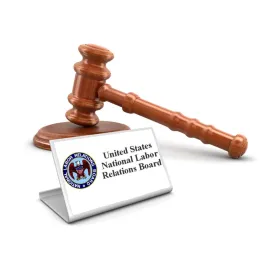Overturning five decades of precedent, the National Labor Relations Board (NLRB or the Board) in Cemex Construction Materials Pacific (372 NLRB No. 130) adopted a new election standard on two key fronts: (1) how may an employer respond to a union’s claim of majority support; and (2) when are employers subject to a bargaining order if an unfair labor practice occurs after a petition is filed but before an election?
Prior to Cemex, the rule under Supreme Court precedent was simple: an employer does not violate the National Labor Relations Act (the Act) by refusing to recognize a union simply based on the union’s claim to represent a majority or workers. Presented with only a claim of majority support, an employer could recognize the union, or choose to do nothing—in which case the union could seek an election through the NLRB-supervised process.
Between the filing of an election petition and the vote, historically an employer would have the right to educate employees about what it means to be in a union, consistent with the Act’s “free speech” provisions. During that period, if the union or the employer engaged in unlawful conduct, the NLRB could order a re-run election. However, in cases where the employer was found to have committed egregious unfair labor practices such that a fair election was no longer viable (and provided that the union had also demonstrated majority support of employees), the NLRB could issue a “bargaining order” without a re-run election.
In Cemex, the Board tossed out longstanding precedent and ruled that an employer has two options when confronted with a union’s claim of majority status: (1) recognize and bargain with the union; or (2) promptly file a petition with the Board seeking an election among employees (an “RM” petition). If the employer fails to act, then it has committed an unfair labor practice. The Board also found that if an employer seeks an election and then subsequently commits a meritorious unfair labor practice that would normally justify setting aside the results of an election, the Board will now order the employer to recognize and bargain with the union without even conducting a secret ballot vote.
The Cemex decision is at odds with scores of prior decisions over decades expressing the Board’s preference for secret ballot elections, and raises more questions than it answers. For example, if an employer exercises its rights under Cemex and files an election petition, does the longstanding rule, that a petitioner’s unit need only be “an appropriate unit,” apply? If the employer seeks a speedy election to minimize the potential for inadvertent violations and the union opposes that timeline, how will the Board respond? Will unions be required to describe the precise scope of the unit they claim to have majority support in and disclose the percentage of such support in order to enable employers to make fully informed decisions regarding union recognition and to account for employees who have not expressed a desire for union representation?
Moreover, the number of bargaining orders—until recently reserved for only the most extreme cases (such as the firing of vocal union organizers) may increase significantly. Employers may well be ordered to recognize a union without an election, potentially against their employees’ wishes, based on technical or inadvertent labor law violations. For example, the recent Stericycle decision may have made many employer handbooks unlawful overnight. See August 2023 GT Alert. An employer still in the process of updating its policies likely would be at risk of a bargaining order given the body of Board law stating that an unlawful handbook rule is per se grounds for setting aside an otherwise fair election, even where the rule is not shown to have affected the results.
While the NLRB’s new standard is expected to be challenged in the Courts of Appeals, employers may see increased union organizing—including in non-traditional settings such as office and corporate workplaces—and increased utilization of the once-rare bargaining order remedy by the Board. Employers should review work rules, policies, and union awareness practices to ensure compliance with recent Board guidance and be prepared to lawfully and strategically respond to a demand for recognition.



 />i
/>i
